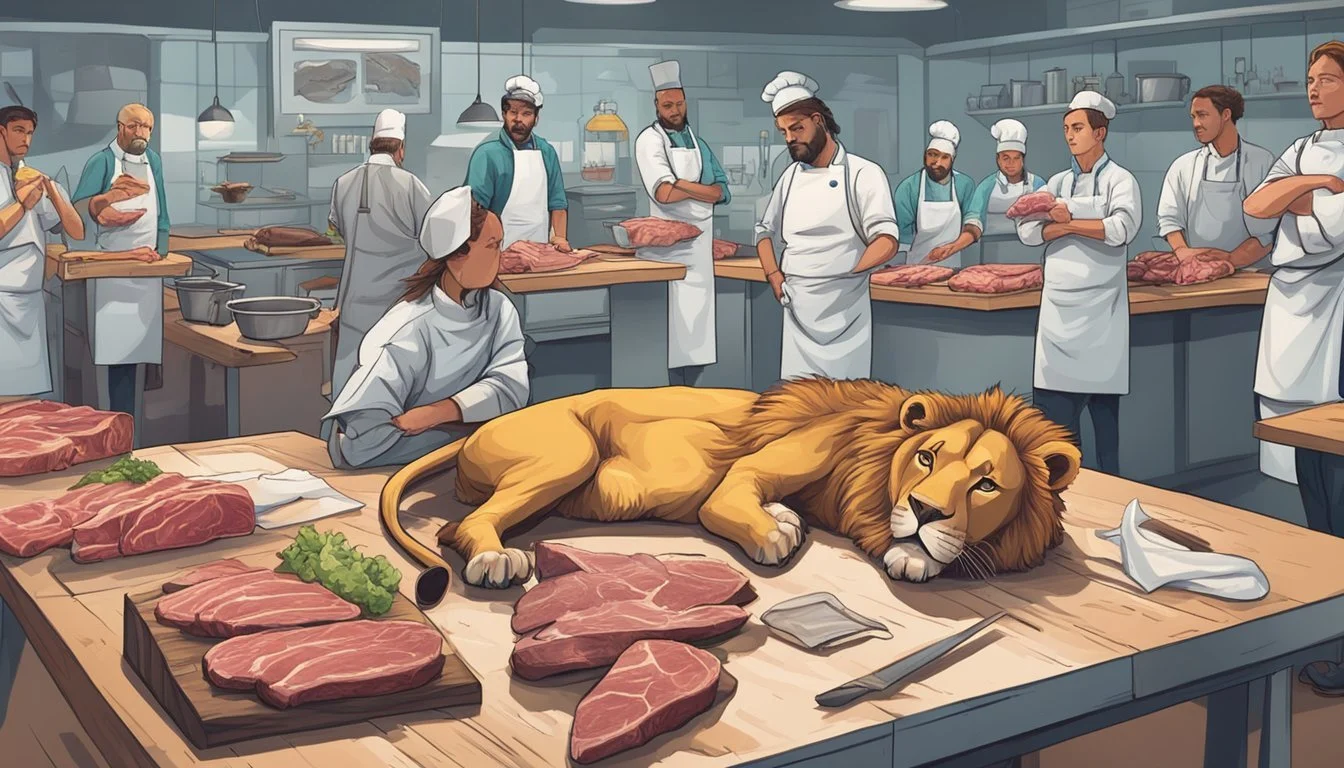Lion Meat
The Controversial Cuisine Stirring Debate Worldwide
The consumption of lion meat has emerged as a contentious issue across the United States, stirring debate among legislators, animal rights advocates, and culinary enthusiasts. While some consider lion meat a rare delicacy, others vehemently oppose it, voicing concerns related to conservation and ethics. The practice has prompted legislative action, such as the proposal by Illinois Representative Luis Arroyo to ban the possession, breeding, buying, or selling of lions for their meat. This measure reflects a growing unease about the commodification of a species traditionally not seen as livestock.
The culinary use of lion meat has also ignited a broader conversation about the consumption of exotic meats. Restaurants, particularly one in Florida known for its unusual taco fillings, have faced criticism for incorporating lion meat into their menus. This public disapproval partly stems from the sharp decline in the world's lion population over the past two decades. The drop by about half has led wildlife protection groups to campaign for lion's inclusion in endangered species protections.
The ethical implications of consuming lion meat, the potential impact on already diminishing lion populations, and the legal framework surrounding the trade create a complex landscape. Advocates for wildlife conservation argue that eating lion meat cannot be considered a harmless choice in light of these factors. Meanwhile, the legality of selling and consuming lion meat in the United States remains a gray area, resulting in persistent controversy and dialogue.
Exploring Lion Meat
Lion meat, a topic of both curiosity and controversy, straddles the line of exotic cuisine and contentious ethical debate. The consumption of this meat raises questions about legality, conservation, and the culinary motivations behind seeking such exotic flavors.
Historical Context
Traditionally, big cats—such as lions, tigers, and panthers—are not a common food source. However, lion meat has occasionally been consumed in certain contexts. Historically, some cultures have partaken in eating lion meat. For example, warriors in some African tribes would eat lion meat to absorb the animal's strength and prowess. Additionally, Chinese medicine has a history of using parts of various big cats for their purported health benefits, though lion meat is not typically among them.
Geographic Distribution
The geographic distribution of lion meat consumption is not widespread and is limited to a few countries. While lions roam in the wild of Sub-Saharan Africa and a small population resides in the Gir Forest of India, the eating of their meat is not a widespread practice. In terms of legality, some regions have contemplated or enacted laws to prevent the sale and consumption of lion meat, highlighting its rarity as an exotic meat. In the United States, it is not common fare, but occasionally it crops up in novelty dishes at exotic meat restaurants. Due to population declines, certain African lions have been proposed for inclusion on endangered species lists, raising conservation concerns and influencing legal restrictions on commodifying lions for their meat.
Culinary Aspects of Lion Meat
Lion meat, a subject of culinary curiosity, is known for its unique flavor profile and the various traditional and contemporary cooking methods that apply to it.
Flavor Profile
The flavor of lion meat is often considered similar to game meats, with a robust and slightly wild taste. Like other wild game, lion steaks could be described as having a richer and more intense flavor compared to common livestock meat.
Preparation and Cooking
When preparing lion meat, it is vital to ensure appropriate food safety measures. The meat should be well-cooked to avoid potential pathogens. Lion burgers and lion tacos are examples of dishes where the meat is commonly thoroughly cooked, often grilled or pan-fried to ensure a safe and palatable experience.
Cooking methods for lion meat:
Grilling: Ideal for steaks, bringing out a smoky flavor.
Pan-frying: Suitable for burgers and taco fillings.
Braising: Often used for tougher cuts to make them tender.
Traditional Dishes
While not widespread, some regions where lions are native might have historically included lion meat in their diet. However, today's instances of lion tacos or burgers are more a novelty rather than a continuation of any longstanding culinary tradition. They are often found in speciality restaurants aiming to offer an adventurous eating experience.
Ethical and Legal Considerations
In the realm of exotic meats, the legal and ethical implications surrounding the consumption of lion meat stir a significant debate. Central to the discourse are conservation challenges, regulatory frameworks, and societal attitudes.
Conservation Issues
African lions are classified as a vulnerable species, grappling with threats such as habitat loss, poaching, and the wildlife trade. Conservation groups argue that demand for lion meat can intensify these pressures, directly impacting lion populations. Captive-raised lions are not exempt from conservation concerns, as they may contribute to a market that indirectly supports poaching and the broader wildlife trade.
Regulation and Laws
In the United States, where the trade of lion meat is not expressly illegal, regulatory bodies like the USDA and FDA oversee the general consumption of game meat. Specific legislation to ban lion meat has been proposed in some states but is not yet widespread. Illinois once attempted to pass the Lion Meat Act to outlaw the ownership, breeding, and sale of lion meat, setting a potential precedent for other states to follow suit.
Public Perception
Public attitudes toward consuming lion meat vary, though there is often a strong ethical opposition grounded in the lion's cultural significance and conservation status. Ethical considerations encompass the treatment of captive-raised lions and the broader ramifications of normalizing consumption of an endangered species. Moreover, the general public's reaction can sway lawmakers' willingness to enact regulations curbing lion meat trade.
Environmental Impact
The production and consumption of lion meat implicates serious environmental concerns, focusing on both the depletion of natural habitats and the potentially adverse effects on biodiversity.
Natural Habitat
The existence and proliferation of markets for lion meat can lead to increased pressure on African lion populations and their habitats. The natural habitat of lions, already encroached upon by human land use, is further stressed when lions become targets for meat production. Land use change for agriculture or hunting purposes not only threatens the lions but also disrupts the entire ecosystem in which they play a crucial role.
Climate Crisis: Habitat destruction contributes to the climate crisis by releasing stored carbon into the atmosphere.
Water Use: Natural predators like lions are essential for maintaining the balance in ecosystems, which includes the management of water resources.
Biodiversity Consequences
The hunting and farming of lions for meat can have cascading effects on biodiversity. Lions are apex predators, and their removal can lead to what ecologists call 'trophic downgrading,' where the absence of a top predator leads to the overpopulation of prey species and subsequent habitat degradation.
Gamey Taste: An argument for consumption is the unique, gamey flavor of wild lion meat; however, this cannot justify the potential biodiversity loss.
Consequences for Other Species: The loss of a single apex predator like the African lion can have unforeseen consequences on numerous other species within the same ecosystem, leading to a reduction in biodiversity.
Market and Demand
The market for lion meat, often considered an exotic meat, demonstrates a unique niche in the culinary world. It caters to a subset of consumers looking for unusual gastronomic experiences, with demand present in various regions, including some pockets within the United States.
Consumer Interest
The demand for lion meat, though not widespread, finds its roots among adventurous foodies and some restaurants looking to differentiate their offerings. In locations such as New York City and Florida, establishments have occasionally made headlines for incorporating lion meat into their menus—think $35 lion tacos—which underscores a certain level of consumer interest. These dishes are generally marketed as exotic experiences, aiming to attract customers through novelty.
Availability and Pricing
Lion meat's availability is relatively rare and is subject to a network of specific farms and trade operations that manage to supply this type of meat. U.S. restaurants that offer lion meat typically source it through specialty meat suppliers. As for pricing, lion meat can be significantly costlier than conventional meats, a reflection of its rarity and niche market. Prices can vary widely, but reports have cited figures like 100 pesos (approximately $6) for a lion burger in Mexico City markets or substantially higher rates in U.S. establishments for dishes like lion tacos.
Alternatives to Lion Meat
As the dining public becomes more aware of ethical and sustainability issues surrounding exotic meats like lion, many are seeking other options that align with their values. These alternatives prioritize sustainability and animal welfare, without compromising on the desire for diverse and novel culinary experiences.
Plant-Based Options
Individuals seeking alternatives for ethical or environmental reasons often turn to plant-based proteins. Brands like Beyond Meat and Impossible Foods craft products that mimic the taste and texture of traditional meat, serving as direct substitutes for exotic meats, including the taste and experience of consuming lion meat. Dishes utilizing these proteins can be crafted with a combination of:
Legumes (beans, lentils)
Soy products (tofu, tempeh)
Nuts and seeds
Whole grains (quinoa, bulgur)
These ingredients not only offer a rich array of proteins but can also be used creatively to simulate a variety of textures that could appeal to those curious about the novelty of lion meat.
Cultivated and Lab-Grown Meats
For those committed to the consumption of real animal proteins but concerned about conservation and ethical sourcing, cultivated meat is a burgeoning sector. Companies like Primeval Foods are at the forefront, developing techniques to grow meat from cell lines in controlled environments. This method promises to produce meats with less impact on biodiversity and animal welfare, as it eliminates the need for domestication and slaughter of wild species. Cultivated lion meat could become available through such technology, offering the experience of eating exotic meats without the negative implications tied to traditional procurement methods.
Lab-grown, or cultivated meat, is produced by:
Harvesting muscle cells from animals
Cultivating these cells in a nutrient-rich environment
Using bioreactors to grow the tissues into meat
The progress in cultivated meats suggests that soon consumers may have access to alternative proteins that satisfy the demand for exotic flavors while adhering to higher ethical and sustainability standards.
Cultural Significance
The consumption of lion meat taps into complex cultural paradigms, where it often intertwines with symbolism and reflects certain social statuses. This section unpacks the cultural implications of eating lion meat.
Symbolism and Status
Eating lion meat is not a common practice globally, but where it occurs, it is steeped in symbolism. The lion, traditionally seen as the "king of the jungle," embodies power, strength, and courage. This iconic status of the lion has led to its integration into various cultural rituals and practices.
Consuming exotic meats, such as those from lions, can be associated with affluence and status. In some cultures, ingesting parts of powerful animals like lions and tigers is believed to imbue the consumer with the animal's desirable attributes, enhancing physical strength or virility.
It is worth noting that while tiger meat is also considered exotic, it is different from lion meat and comes with its own set of cultural implications and legal restrictions.
Due to its rarity and the complex legalities surrounding it, African lion meat is particularly contentious. In some instances, products like lion bone can also find their way into the market, often used to create traditional medicines such as bone wine, believed by some to have health benefits.
The symbolism associated with lion meat and its derivatives is deeply rooted in certain traditional practices, though the ethics and legal acceptability of such consumption are subjects of ongoing debate.
Health and Safety
Consuming lion meat is a subject of health and safety considerations that encompass both its nutritional value and potential health risks.
Nutritional Value
Lion meat, like that of other carnivores, is a source of protein, which is essential for body repair and muscle growth. Nutritional comparison:
Nutrient: Protein, Lion Meat: High, Common Meats (e.g., Beef): High
Nutrient: Fat Content, Lion Meat: Variable, Common Meats (e.g., Beef): Variable
Nutrient: Vitamins, Lion Meat: Present, Common Meats (e.g., Beef): Present
Nutrient: Minerals, Lion Meat: Present, Common Meats (e.g., Beef): Present
While it contains important nutrients, it is not commonly consumed and does not have a significant place in a standard diet, unlike the meat from herbivores or more traditional sources.
Risks and Concerns
A major concern with consuming lion meat is the presence of parasites and diseases that can be transmitted to humans. Carnivores are higher up the food chain and may accumulate more contaminants compared to herbivores or commercial livestock. Additionally, the conditions under which lion meat is procured, stored, and prepared can vary significantly, further influencing its safety. It's noteworthy that parasites in improperly handled or undercooked meat pose a serious health risk.
Another issue is the potential legal and ethical risks associated with eating an exotic and potentially endangered animal. Laws governing the sale and consumption of lion meat can be complex and are subject to change, which can affect the safety and regulation of this meat in the food supply.
The Future of Lion Meat
As ethical considerations and regulatory measures shape the trajectory of lion meat consumption, emerging technologies play an instrumental role in its future.
Technological Advances
Cultivated Lion Meat: Companies like Primeval Meats are pioneering the production of lion meat through cellular agriculture. They are working towards creating cell lines that can be used to cultivate lion meat in a controlled environment, without harming actual lions. This method could potentially meet regulatory approval for a more sustainable and ethical approach to consuming exotic meats.
Regulatory Approval: Before cultivated lion meat can reach the consumer market, it needs to undergo stringent regulatory scrutiny to ensure safety and compliance with food standards. The path forward will require transparent collaboration with food safety authorities.
Global Trends and Predictions
Venture Capital Investment: The cultivated meat industry is attracting significant attention from venture capital funds, implying confidence in the sector's growth. This investment may lead to the scaling of production and reduction in costs, making lion meat more accessible.
Energy Consumption: As this industry scales, efforts must be made to ensure energy efficient production processes. The use of renewable energy sources could be a critical component in creating a sustainable model for cultivating lion meat.
Market Adoption: Predictions about the global trends for lion meat consumption hinge on consumer readiness to embrace this unconventional food source. The success of cultivated lion meat will largely depend on public perception and the culinary industry's willingness to incorporate it into their offerings.









